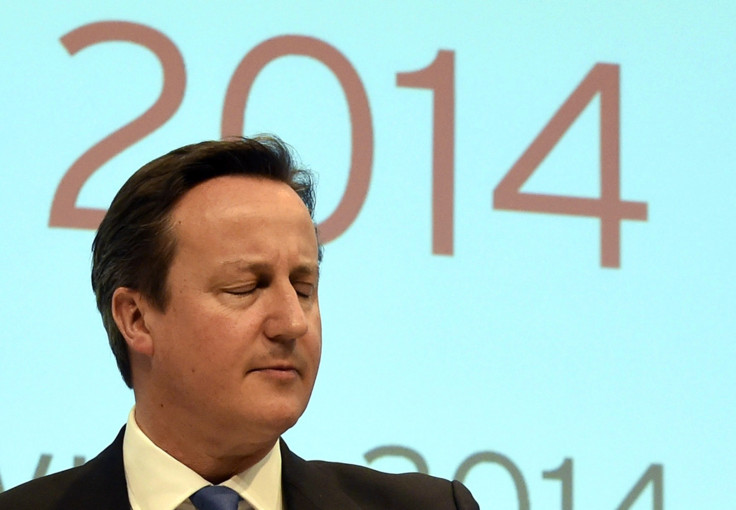Tories fear haemorrhage of support to Ukip after Cameron's self-inflicted wound over EU
At a time when British foreign policy perhaps ought to be most concerned with the threat of militant Islam, or the aggressive stance Russia is taking towards Eastern Europe, it is instead obsessed with our deteriorating relations with the European Union.

The main reason for this is the open borders policy that allows free movement of people between member states. The last Labour government now admits the mistake it made in allowing the immediate admission to Britain of nationals of the former Soviet bloc countries that joined the EU in 2004. Few of these countries had economies that made it attractive for many of their people to stay at home once the chance to move further west presented itself: and many did.
This would not have become an issue in Britain but for the rise of Ukip, the political party that won the 2014 European Elections in Britain and that has now succeeded in having two MPs elected to parliament at by-elections after defecting from the Conservative party.
There is a perception among many people in Britain that immigration from the EU is out of control and must be limited. It is claimed that EU nationals are taking jobs that the indigenous population could easily do, and that they claim lavish amounts of welfare benefits. The first point may well be specious. Many of the immigrants do jobs that the indigenous population would not want to do, and indeed will not do until the way the British benefits system is administered has a greater degree of compulsion.
The benefits point is less contestable, and David Cameron has now said he wants to restrict the availability of such payments to those who have lived in Britain and paid taxes for several years. He is not alone in this. The Germans are interested in such a restriction, and some in the Labour party in Britain believe that there has to be a contribution-based benefits system.
However, to achieve this change, which is designed to make Britain far less attractive for potential immigrants, there has to be a treaty change by the EU. And it is a change that would require unanimity. That will not be forthcoming. So many countries joined the EU precisely to obtain advantages such as this and will not vote to handicap their own people. So Cameron is in something of a hole. His Labour opponents, who wish to paint him as ineffectual on this question, cannot however offer anything better: and they, too, are paralysed with fear at the white-working class vote deserting to Ukip, whose policy on the matter is straightforward: Britain should leave the EU and then be free to set its own immigration policy.
That is the truth that Cameron cannot bear to acknowledge, and many of his MPs and even some of his ministerial colleagues have had enough of the evasion. The British prime minister has talked for some time about holding a referendum on whether or not Britain should stay in the EU. He says that this won't happen for another three years – the end of 2017, or halfway through the next parliament – because he wishes to have plenty of time to renegotiate our relationship with the EU. However, since there is manifestly not going to be a renegotiation, the delay is pointless and misleading. Ukip wants a referendum immediately; the Labour party doesn't want one at all.

When Cameron spoke on immigration last week it was spun as if he was giving an ultimatum to Britain's European partners to accede to his requests to allow member states to enforce their own border controls, or accept that Britain would be likely to head for the exit. That is, however, a misleading interpretation.
The speech was watered down following consultations with the Germans, and therefore constituted no sort of threat at all. And because it constituted no sort of threat, Tory MPs are livid, and are fearing a further haemorrhage of support to Ukip, who (as far as most Conservative voters, and indeed many Labour ones, are concerned) still have all the best tunes when it comes to the EU.
Because of this self-inflicted wound, Cameron is likely to find that, far from dampening the whole issue down, his cack-handed management of it is likely to make the EU an even bigger issue than it was before when Britain goes to the polls on 7 May next year. He has provoked the new President of the European Commission, Jean-Claude Juncker, to say that it would be far worse if France – a certified economic basket-case – left the EU than if Britain did. If the debate about how Britain best fits in with Europe is now to degenerate to a simple trading on infantile insults, then the game probably is up for all concerned.
Dr Simon Heffer is a British commentator and author who has written columns for The Daily Mail, The Daily Telegraph, The Spectator and The New Statesman. He is the biographer of Enoch Powell, Thomas Carlyle and Ralph Vaughan Williams and recently published High Minds: The Victorians And The Birth Of Modern Britain.
© Copyright IBTimes 2025. All rights reserved.






















